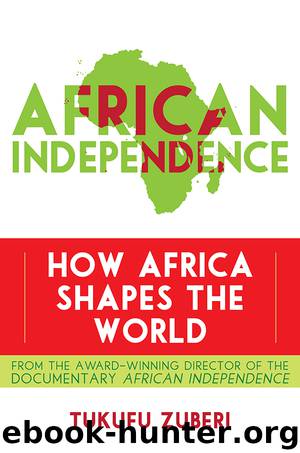African Independence by Tukufu Zuberi

Author:Tukufu Zuberi [Zuberi, Tukufu]
Language: eng
Format: epub
Publisher: Rowman & Littlefield Publishers
Published: 2015-04-20T16:00:00+00:00
African Decolonization and Repression
For different reasons, the Soviet Union and the United States politically encouraged the rise of nationalist movements in Asia and Africa. At first this support was reflected in the call of the two new superpowers for decolonization. Initially, France and Britain tried to respond by opening universities and lower-level schools and by increasing economic assistance and political participation, but these efforts were too little, too late. Africans had grown tired of colonialism, and such rule was of no use to either the United States or the Soviet Union. Ultimately, new approaches were undertaken, as World War II had undermined the myth of European invincibility.4 The calls for decolonization by the United States and the Soviet Union did not mean liberation for Africa, and in fact the decolonization efforts by the new world powers contributed to the African-based forces of repression. In response, the African independence movements sought a way out of this cycle of external manipulations.
Anti-colonial nationalism became more militant in the 1940s and was accompanied by an interim period of internal self-government beginning in the early 1950s. Internal self-government in Africa offered a middle ground for negotiation on behalf of the colonial powers. For the nationalists, internal self-government offered an opportunity to develop organizationally. These processes led to more nationalists demanding independence and to an end of colonialism.
One of the first examples of this increased nationalism in the independence movement centered on the control of the Suez Canal. In Egypt, Egyptian army officers seized power in 1952, and the Egyptian king Farouk was deposed. Within a few years, former lieutenant colonel Gamal Abdel Nasser assumed leadership of the government by declaring himself Egypt’s president in November of 1954. He pushed for the removal of British troops from Egyptian soil. At the time, Britain needed access to the Suez Canal and required Egyptian cooperation. The British were reliant on imported oil that was transported through the Suez Canal. If Egypt refused to cooperate with the British, the supply line would be disrupted, and Britain would have to use its precious dollars to buy oil elsewhere. Britain agreed—as it had promised dozens of times before—to withdraw from the Suez Canal. This time Britain followed through, and after seventy years of occupation, the last British troops withdrew from the Suez Canal on June 13, 1956.
The Cold War was in full effect, and all nations were supposed to take a side. Neutrality was not possible. Every country in the world had to align itself with either the Soviet Union or the United States. Nasser, the leader of Egypt, argued that the only solution for post-colonial countries lay in maintaining neutrality between the two superpowers. Indian prime minister Jawaharlal Nehru and Yugoslavian marshal Josip Broz Tito were also leading supporters of non-alignment. Nasser was a key player in the formation of the movement of independent states from Asia and Africa, which met at the historic Afro-Asian Conference in Bandung, Indonesia, from April 18 to 24, 1955. One of the first Asian
Download
This site does not store any files on its server. We only index and link to content provided by other sites. Please contact the content providers to delete copyright contents if any and email us, we'll remove relevant links or contents immediately.
| African-American Studies | Asian American Studies |
| Disabled | Ethnic Studies |
| Hispanic American Studies | LGBT |
| Minority Studies | Native American Studies |
Cecilia; Or, Memoirs of an Heiress — Volume 1 by Fanny Burney(32558)
The Great Music City by Andrea Baker(32020)
Cecilia; Or, Memoirs of an Heiress — Volume 2 by Fanny Burney(31956)
Cecilia; Or, Memoirs of an Heiress — Volume 3 by Fanny Burney(31942)
We're Going to Need More Wine by Gabrielle Union(19049)
All the Missing Girls by Megan Miranda(16032)
Pimp by Iceberg Slim(14509)
For the Love of Europe by Rick Steves(14124)
Bombshells: Glamour Girls of a Lifetime by Sullivan Steve(14077)
Talking to Strangers by Malcolm Gladwell(13371)
Norse Mythology by Gaiman Neil(13370)
Fifty Shades Freed by E L James(13243)
Mindhunter: Inside the FBI's Elite Serial Crime Unit by John E. Douglas & Mark Olshaker(9344)
Crazy Rich Asians by Kevin Kwan(9293)
The Lost Art of Listening by Michael P. Nichols(7506)
Enlightenment Now: The Case for Reason, Science, Humanism, and Progress by Steven Pinker(7314)
The Four Agreements by Don Miguel Ruiz(6765)
Bad Blood by John Carreyrou(6623)
Weapons of Math Destruction by Cathy O'Neil(6281)
